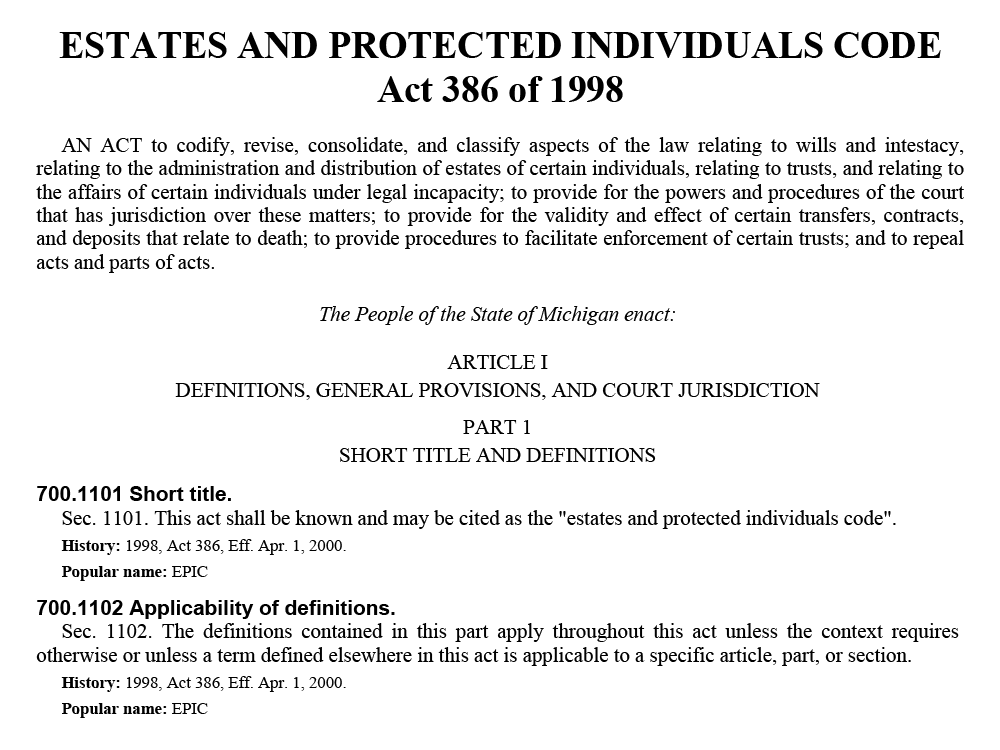Courts may appoint a competent person as guardian to protect individuals who are unable to make decisions for themselves. The vulnerable individuals may be children or adults. Children may require a guardian if parents are unable to provide adequate care. Sometimes, adults require a guardian due to mental illness, physical incapacity, or cognitive impairments. Any person under the care of a guardian is known as a “ward.” Fortunately, courts are primarily concerned with the welfare of the ward. Thus, numerous Michigan Laws involving guardianship protect a ward’s rights.
Michigan Guardianship Laws
Michigan guardianship laws are primarily governed by the Estates and Protected Individuals Code (EPIC). Laws regulate when a guardian may be appointed. For example, a minor may need a guardian due to a death of a parent. Also, a temporary guardian may be appointed if a parent is incarcerated, or hospitalized for an extended period of time due to a significant physical or mental health issue. Additionally, EPIC defines limits on guardianship powers and lists who may be appointed as guardian for children and adults. Michigan law also contains a provision for the removal of a guardian (MCL 700.5310). So, consult an experienced guardianship attorney for advice regarding extensive, guardianship laws.
Types of Guardianships
Guardians may decide where a ward lives, what medical care they receive, and who cares for them every day. Types of guardianship may include:
- Full guardianship
- Limited guardianship
- Temporary guardianship
- Guardianship over estate
Each type and case is different and should be discussed with an experienced probate attorney. Simply put, sometimes a full guardianship is necessary, other times it is not. This is where disputes may arise. In life, situations change. For example, a minor may have had an appointed guardian while a parent was incapacitated or incarcerated. Once the parent is available, the situation has changed and the guardianship may need to be revisited. Once again, contact an attorney for any questions regarding guardianship issues.
Reasons to Contest Guardianship
Despite the court’s best interests to appoint an appropriate guardian, sometimes situations arise where guardianships are contested by concerned family, friends, or wards. Some common reasons include:
- Abuse or neglect- Vulnerable adults or children may fall victim to negligent guardians. If a concerned person suspects any abuse or neglect contact an attorney and the authorities. Your attorney will advise you of the proper steps to take to protect the vulnerable person.
- Poor decision making- Family members may notice a guardian selling assets that belong to an elderly, incapacitated ward. Sadly, some guardians may not use common sense when raising children either. If this lack of common sense rises to the level of harming the child, then the guardianship should be terminated.
- Lack of capacity- Is the ward truly incapable of taking care of their interests? Is the guardianship necessary? Sometimes family disputes arise over the necessity of adult guardianships. Basically, family members disagree and seek legal advice regarding the situation.
- Ward preference- The court WILL listen to the person that a family is trying to seek guardianship over. When a person is under guardianship, someone may control their finances and decision making abilities. In other words, a person loses some essential rights. Even well intended family members must prove that an adult is truly incapable of handling their day to day affairs before the court will appoint a guardian. Of course, a child is another story. Little children are not mature enough to live on their own and sometimes require guardianship. That being said, depending on age, the court will interview the child regarding preferences. Once again, seek legal advice setting up any legal document.
How to Contest Guardianship
Contesting guardianship involves a legal process. In other words, your first step is to contact a probate attorney. Next, your attorney will guide you through the following steps:
- File a motion with probate court
- Notify all involved parties
- Gather information and evidence
- Mediation may be a possibility
- Trial may be a possibility
- Appeal if necessary
- Final order
Contesting guardianship is a complex and time consuming process. As a result, make sure you hire an experienced attorney to handle your case.

